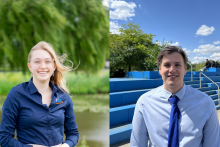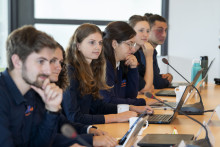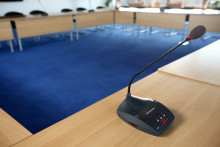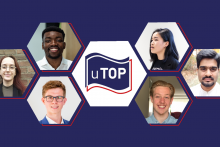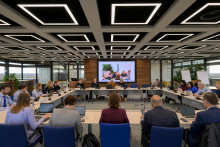How might students know you already?
Binnekamp: ‘I’m a fourth-year Health Sciences student and have been active in various committees throughout my student life. I just completed a part-time board year with Integrand, and currently work with the Student Union on the Sports and Culture portfolio.’
Van der Aa: ‘I study Psychology and have been on the University Council for a year now with UReka. I also served on the board of Dimensie, the Psychology study association.’
What do you stand for—what are the key points from your party’s platform?
Binnekamp: ‘A lot stays the same each year—like protecting the quality of education. We believe the UT must maintain high standards, especially now with all the budget cuts. At the same time, student numbers are dropping. How do we ensure students still have access to the opportunities they’re looking for? We believe studying here isn’t just about earning a degree, but about personal transformation. DAS sees it as essential that students can grow outside their studies as well. I want to keep holding the UT accountable for that responsibility.’
Van der Aa: ‘Education shouldn’t suffer due to cutbacks. That means we need to set clear priorities—decide what gets attention and what has to take a back seat. Personally, and from my background in Psychology, I care deeply about wellbeing, so I strongly support initiatives like the Wellbeing Weeks. We, as a UT community, need to keep investing in things like that—just like we do with sustainability and inclusion. But above all, I believe in student engagement. Engaged students are the backbone of our university. UT delivers more than graduates—it produces students with valuable leadership and organisational experience. As a former board member, I know how important that is, and I want that opportunity to be available to everyone. Right now, we’re working hard on the new StOF policy—formerly known as FOBOS—to make sure students involved in extracurricular activities get the recognition and support they deserve.’
Why is representation on the university council so important?
Binnekamp: ‘When a university makes a decision, it affects us as students. So I think it’s only fair that we have a say. By listening to students, UT can improve both the quality of education and the overall student experience. Everyone benefits from that.’
Van der Aa: ‘It’s important that we’re heard. Often, decisions at the executive level are based on abstract numbers, without considering how they affect people. But students are the heart of this university. That’s why the University Council needs to reflect the diversity of the student population and offer real input on where the university is heading.’
Why should students vote for you?
Binnekamp: ‘As a newcomer, I bring a fresh perspective and new energy. I’m committed to representing a broad range of students, and I focus on both education and extracurricular development. I believe it’s especially important to protect the student voice during times of change and budget cuts. Thanks to my experience with the Student Union, I’m well equipped to advocate for strong education while also championing personal growth and wellbeing. I want to ensure students have a real say—in their studies and beyond.’
Van der Aa: ‘You should vote for the person or party that aligns with your values. At the end of the day, we all want the same core things. That said, I’m currently the only female lead candidate, and I already have some council experience. Where DAS focuses more on student housing and associations, UReka tries to take a broader approach—we also represent international students. You can see that reflected in the diversity of our council group.’
The parties' key points
DAS
- No extended study fines
- Grades should remain valid for longer
- More space for personal initiatives and development
- No cuts to the StOF/FOBOS support programme for students in exceptional circumstances
- Stronger national cooperation between student councils and better representation in faculty councils
- More focus on integration and Dutch language lessons
- Expansion of study spaces and sport/cultural associations
Full programme available on the DAS website.
UReka
- Education: preserve personal attention for students
- Keep a close eye on educational quality
- Ensure lecturers speak good English—only use Dutch if it truly adds value
- Encourage student involvement through visibility, appreciation, and removing barriers
- Improve communication with the UT community about what’s happening
- Give entrepreneurial students more freedom and support
- Make more student psychologists available, or offer alternatives
- Strengthen ties with Kennispark to keep graduates and start-ups in Twente
Full programme available on the UReka website.


